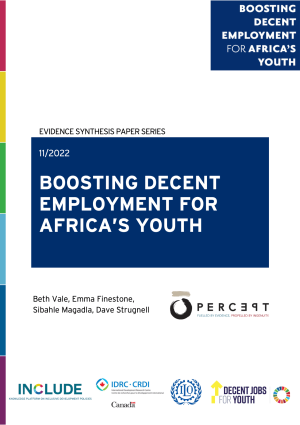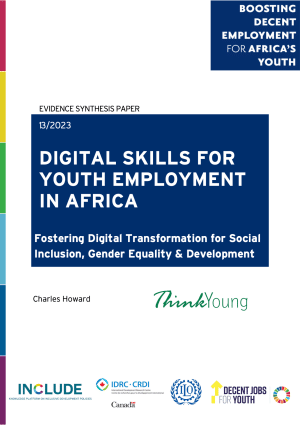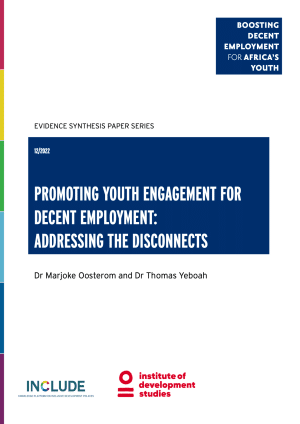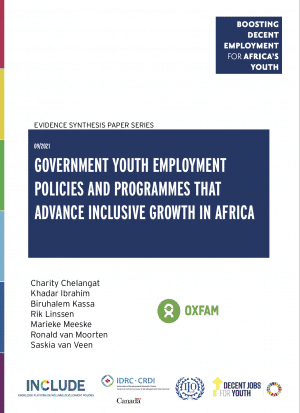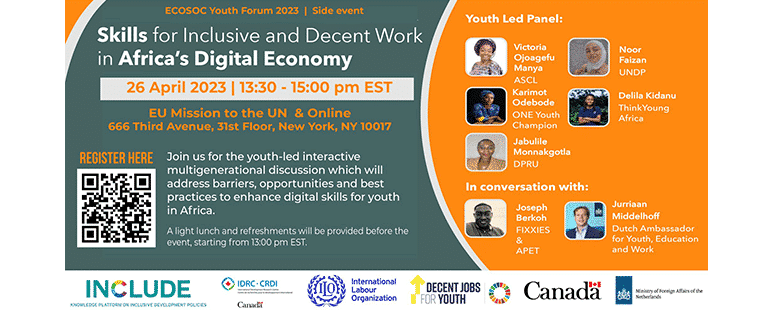
By Giovanni Puttin
Under the aegis of the Decent Jobs For Youth Global Initiative, INCLUDE, IDRC and ILO co-organised a side event to the UN 2023 ECOSOC Youth Forum in New York. The conversation, led by youth, focused on addressing barriers, opportunities and best practices to enhance digital skills for youth in Africa.
The event was sponsored by the Permanent Mission of the Netherlands to the United Nations, the Dutch Ministry of Foreign Affairs and the Permanent Mission of Canada to the United Nations and builds on INCLUDE’s evidence synthesis paper Digital Skills for Youth Employment in Africa, recently published in the context of the Boosting Decent Employment for Africa’s Youth research programme.
Developing the digital skills necessary to utilize technology meaningfully is considered essential for achieving the 2030 Agenda for Sustainable Development. In Sub-Saharan Africa alone an estimated 230 million jobs will require digital skills within the next decade. However, young people in Africa face several barriers that prevent them from obtaining the types of skills required for digital employment.
Rather than see this with resignation, our panellists argued that Africa’s skills gap presents an opportunity to reverse the continent’s jobless growth trend and promote thriving economies well adapted to the challenges of the 21st century.
Key challenges for digital skills development
The changes to the job market, accelerated by the use of technology during the Covid-19 pandemic, disproportionately affected marginalised youth. For this reason, Beatrice Maille (Minister-Counsellor, Permanent Mission of Canada to the United Nations) emphasised that leaving this group unattended will further deepen the digital divide. The youth-led panel identified specific barriers that policymakers need to address in order to close the connectivity gap, including:
Education. According to Noor Faizan (UNDP Youth Leadership Programme), “the digital transformation journey needs to start from schools,” however, African curricula are limited when it comes to digitalization. Delila Kidanu (Director, ThinkYoung Africa) explained what type of digital skills are needed to capitalise on digital transformation, emphasising the role of foundational digital skills for life-long learning. For graduates, skills training initiatives should be offered ideally in combination with digital hubs. The panellists also noted how language issues are preventing digital uptake, with many tools not localised to local languages.
Infrastructure. Karimot Odebode (Black Girls Dream Initiative in Nigeria) explained how we cannot build digital skills without digital infrastructure. Many African countries still fall short of developing the infrastructure needed for digital technologies. To address this gap it will require widespread access to affordable and reliable broadband connections and a more secure energy grid.
Data. Jabulile Monnakgotla (Research Fellow at the University of Cape Town) pointed to the lack of representative data on digital skills development which prevents the implementation of evidence-based policies. Inconsistent labour force data poses a challenge for researchers and a threat for marginalised youth to be left out of government responses to close the digital divide. In addition, Joseph Berkoh (AU High Panel on Emerging Technologies) highlighted the lack of awareness and understanding on the side of national policymakers regarding the use of digital technology and data collection for more effective public service provision.
Alignment. Currently, digital skills development programmes are not aligned with the specific needs of different youth groups as well as the needs of the private sector, failing to achieve inclusive and decent employment opportunities.
On the country level, national digitalisation strategies can achieve synergies with other programmes related to achieving decent youth employment through cooperation between different ministries beyond the prevailing siloed approach. For this, Amina Gurhan (Diplomat, Permanent Mission of Uganda to the United Nations) promoted the implementation of national development plans that commit the different bodies to deliver quality education and digital inclusion. Lastly, Jurriaan Middelhoff (Ambassador for Youth, Employment and Work, Ministry of Foreign Affairs of the Netherlands) reflected on the importance of strategic regional and multi-stakeholder partnerships to ease the implementation of best practices regarding digital skills development and youth employment programmes.
Policy Recommendations
- National education institutions need to improve the quality and relevance of general education. For example, by providing digital tools for schools to improve digital education outcomes. Furthermore, they can leverage technical and vocational education & training (TVET) and build digital training hubs.
- Policies should be tailored to the local context and the heterogeneous needs of different youth groups, particularly for young women, for example by consulting youth on openly accessible digital platforms.
- Governments need to seek strategic partnerships with the private sector and meaningfully involve youth in all stages of partnership development in order to align programmes to the needs of youth and the labour market.
- Policymakers should invest in the digitalisation of public services and the state-citizen interface, which can support the creation of databases that can inform more appropriate policymaking.
- Public and private financing needs to be made available to improve digital infrastructure like broadband and energy grids.
Digital transformation has put developments in motion that require governments, educational institutions, the private sector and international organisations to engage with the future of work already today. The panellists shared that stakeholders should include youth in their digital transformation plans, starting with transforming the educational system and making their digital skills future-proof.
You can watch the recording of the session at this link.
For more information on INCLUDE’s work on boosting decent employment for Africa’s youth, please visit this page.
